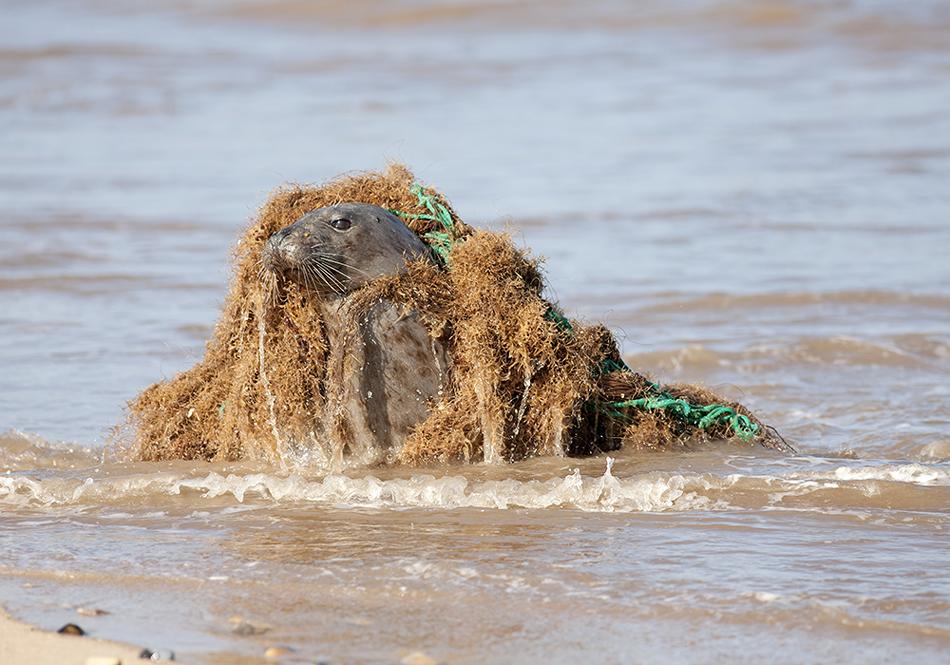
Photo: as water warms, cold water species such as the wolf fish retreat north
How is climate change affecting what we see underwater in the UK, asks Becky Hitchin.
This week’s highlight was the news of a new nudibranch found in the UK, Pleurobranchaea britannica. This follows the discovery of the rainbow-coloured slug Babakina anhedonia in the same area in 2023, typically seen in the warmer waters off the coasts of Spain, Portugal and France. Several other nudibranchs have also recently been found around the UK that are better known from warmer waters.
Climate change is inherent in these new appearances of small sea slugs. The seas around the British Isles, and in particular, the southern North Sea have been identified as one of 20 global areas that have warmed the fastest over the past 50 years. UK sea levels have risen by an average of 12-16cm since 1900, and sea temperatures are continuing to rise, by 0.4% per decade.
As a result of these warmer temperatures, concentrations of dissolved oxygen decrease, compounded by increasing acidity and falling levels of salinity. This triple whammy has huge knock-on effects for a wide range of organisms. Sea surface temperature change affects different sized organisms differently. Small infaunal creatures [those that live in soft sediment] tend not to show such a change, as increased availability of food associated with the temperature increase helps damp the effect.
Larger organisms, however, experience changed community structures due to increased competition for food. This affects both plants and animals. The latest review by the Marine Climate Change Impacts Pathway suggests that North Sea burrowing species have both shifted their distributions in response to changing sea temperature, and have needed to try to become adapted to warmer temperature than they were previously exposed to. This has led to decreases in vital rates and changes in behaviour.
Larger organisms... experience changed community structures due to increased competition for food
The Marine Climate Change Impacts Pathway highlights a case of kelp changes associated with sea surface temperatures. Laminaria ochroleuca, the golden kelp, has increased in abundance and expanded its distribution into more wave-exposed conditions from its original warmer water conditions. Why does this matter? Well, each species of kelp is slightly different.

Babakina anhedonia and Pleurobranchaea britannica have now arrived from warmer waters
Colder water kelps such as L. digitata and L. hyperborea, the standard kelps we see in very shallow UK waters, host a huge amount of other species on their stems and blades. All divers have marvelled at the amount of life on the subtidal kelps – after all, what else are shore dive safety stops for? Bryozoans, red seaweeds, hydroids, all sorts of molluscs graze on that carpet of organisms attached to kelp. Golden kelp, however does not. This lack of three dimensional community structure leads to changes in structural changes in ecosystems as well as changes in how ecosystems function.
Scientists also looked at the angular crab, Goneplax rhomboides. They found that the crab has been moving into the Moray Firth and further, into the southern North Sea, driven by increased sea surface temperature – in this case, the North Sea becoming warmer and more available to species that historically have lived only in warmer climates.
Also changing are the UK fish stocks. Cefas, a UK agency working to ensure a sustainable future for our rivers, seas and the ocean, has recently shown that warmer seas are already having an impact on fish stocks around the UK. Warm water species are increasing, such as anchovy, bluefin tuna, squid and red mullet.
The number of bluefin tuna around the south coast of the UK is now at such a level that the UK government has created a stock quota for the fishery. In parallel, cold-water species are seen to be retreating. These include such charismatic species such as wolf-fish and Atlantic cod. These are only some examples. It would be good to hear local experiences of how our seas are changing. What species are new? What normal creatures have become rare? How is climate change affecting your diving?
Article ‘All change in our shallow seas’ by Becky Hitchin first published in SCUBA magazine, Issue 145 May 2024.

 Author: Becky Hitchin | Posted 30 May 2024
Author: Becky Hitchin | Posted 30 May 2024



